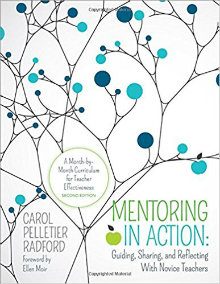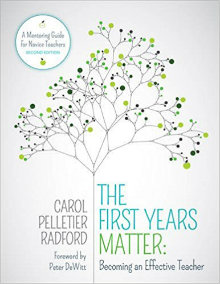Two Books to Support New Teacher Mentoring
Mentoring in Action: Guiding, Sharing, and Reflecting With Novice Teachers: A Month-by-Month Curriculum for Teacher Effectiveness
The First Years Matter: Becoming an Effective Teacher: A Mentoring Guide for Novice Teachers
By Carol Pelletier Radford (Corwin, 2017 – Learn more)

It’s the end of my fourth year as a middle school teacher and I am doing a write-around activity. In my classroom, the timer is going and I am looking around the room at the students working diligently.
The buzzer goes off and students pass papers along for the next student to make a contribution. Students are engaged and using notes to add information to the ever growing essay. It can be difficult to add on to others’ writing in a timed situation, but the students are engaged and I am a happy teacher.
So, how did I come to a point where I have activities like this at the ready and know how to manage them?

During the fall of 2005 I was hired as an elementary Italian teacher and taught adult classes at night. That was a grant position and I was then hired at a high school in the fall of 2006. Although I had planned to teach, I did not take many education classes. In my naive state I considered only content necessary to teach. Well, I quit the high school job halfway through the year. Maybe having a mentor would have helped.
I stopped teaching and went on to pursue a masters in history and a graduate certificate in education. Fast forward to 2013 and I was applying for teaching jobs again. After several interviews I felt fortunate to get offered a building sub position in the community I grew up in. It wasn’t my own class, and it was middle school. Still, I was happy to have a job in this system.

Now, I am in a position of an emerging teacher-leader and a current fellow in the Teacher Leadership Initiative. My projects and capstone work will focus on better welcoming and supporting new teachers in the district, and I have plans to pursue doctoral studies looking at new teacher education.
With all this in mind I can think of no better program than Carol Pelletier Radford has presented in her books Mentoring in Action and The First Years Matter.
When I think back to what I would have wanted, it was a clearly defined program that I could use to grow as a new educator. We all know the first year is pure chaos, so having a monthly mentoring plan can help a new teacher keep on track and monitor needs and growth.
What’s inside these two books
As a set the books provide great advice for both mentors (Mentoring in Action) and mentees (The First Years Matter). There is a great list on page 11 from Mentoring in Action, aimed at mentors.:
What Are the Qualities of Effective Mentors?
- An Effective Mentor Is a Competent Teacher.
- An Effective Mentor Is Prepared to Be a Mentor.
- An Effective Mentor Shares the Joys of Teaching.
- An Effective Mentor Integrates Student Perspectives Into Mentoring Conversations.
- An Effective Mentor Is a Good Listener.
- An Effective Mentor Provides Nonjudgmental Feedback.
- An Effective Mentor Schedules Regular Meetings.
- An Effective Mentor Brings a Positive Disposition to the Relationship.
- An Effective Mentor Is a Confidential Colleague.
- An Effective Mentor Is Committed to Mentoring!”
What I think really makes Radford’s package effective is her support for new-teacher reflection and the help she offers mentors in anticipating questions and issues. I have recently begun to use needs assessment, and this program utilizes a monthly needs assessment which is a fantastic way to analyze what is happening in your classroom. It is easy to let the days get away from you, but as a new teacher you need time for meaningful reflection, especially when it is facilitated by an experienced and prepared mentor.
The clearly defined mentor/mentee schedule and routines make the program rigid but allows for flexibility for the relationship to grow to meet the needs of both people. This program will allow a mentor program to flourish in any district.
When we look at the staggering statistics about how many new teachers are leaving the profession, I feel one substantive way to change this is to assure all new teachers are able to participate in an excellent mentor program. Radford’s books can provide the foundation to build such a program.
Michael DiClemente is a sixth grade Ancient Civilizations teacher in Medford, MA who also advises the Yearbook Club and the Middle School Model UN Club. This fall, Michael will be taking on the responsibility of New Teacher Liaison in his district, which is a new position. In this position he will seek to better welcome and support new teachers.






























